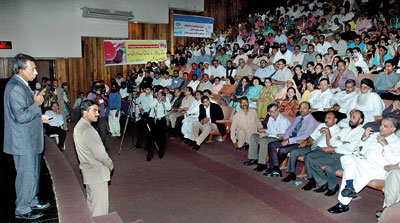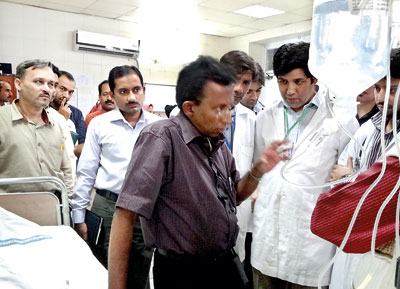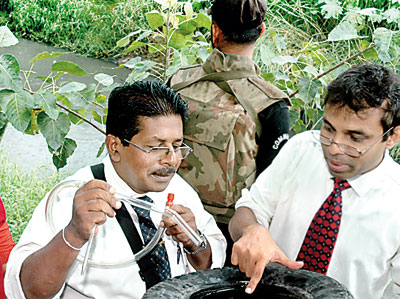Swirled around and drowning in an epidemic of dengue, it was to a top Sri Lankan health team that Pakistan's Punjab province turned in their desperation last September.
Two visits and much advice and guidance on the part of the Sri Lankans and quick action by Punjab not only in clinical management but also prevention have seen a major turnaround in the dengue situation in Punjab, while ironically Sri Lanka is grappling with an epidemic which is threatening to get out of control, the Sunday Times understands.
 |
| Dengue talk in Lahore by Dr. Fernando to a large gathering including the Chief Minister |
 |
| Discussing the management of a patient in a Lahore hospital |
 |
| Other members of the Sri Lankan team in action in Lahore |
Has the time come for Sri Lanka to "learn a lesson" from Punjab, is the query on the minds of many health experts.
Ninety-nine percent of the dengue deaths are preventable, stresses Consultant Paediatrician Dr. LakKumar Fernando of the Negombo Hospital, who was part of the team that made the turnaround possible in Punjab within a short time.
Perfecting clinical management will save more lives, he points out. When fluid leakage starts, there is only a very small window, just 48 hours, for survival or death to take place. Those with mild to moderate leakage will survive but those with severe leakage will die if management is not thorough.
When the first 12-member Sri Lankan team -- Dr. Hasitha Tissera, Dr. LakKumar Fernando, Dr. Jayantha Weeraman, Dr. Kolitha Sellahewa, Dr. Sunethra Gunasena, Dr. Risintha Premarathna, Dr. Nayani Sooriyarachchi, Entomologists Dr. P.H.D. Kusumawathi and D.N. Sumanasena, Nursing Sisters Gabrial, Malkanthi and Rasika -- alighted at Lahore Airport to a red carpet welcome and bullet-proof BMWs and armed escorts in this city wracked by terrorism, they found a province struggling in the dark to overcome the scourge of dengue. Although it was risky business in a city-ridden with security issues, the team that went had a "passion" to battle dengue and met by Punjab's Chief Minister Muhammed Shahbaz Sharif and surrounded by journalists, felt they were the only hope.
The hospitals in Punjab the biggest province in Pakistan with a 100m population, five times that of Sri Lanka, were overflowing with dengue patients, says Dr. Fernando.
The initial assessment was overwhelming...."Six thousand dengue patients would throng each of the six major Teaching Hospitals in Lahore daily," says Dr. Fernando. The machines which could give full blood count test results in less than five minutes were lined up in each outpatient department.
The "platelet mania" had also hit Punjab. While people were drinking papaya and apple juice under the misconception that it was the answer to a low platelet count, the provincial government was under pressure to buy platelet aggregator machines worth several million rupees under the ill-conceived notion that their lack was resulting in patients dying, it is learnt.
Initially the top doctors including professors were a bit reluctant to listen to the Sri Lankans as they felt they knew everything about the clinical management of dengue gleaned from the internet and also all sorts of guidelines, explains Dr. Fernando. "At first they were reluctant to listen to us who had learnt about dengue management the hard but thorough way and wanted us to talk to general practitioners."
He points out that they didn't know how to differentiate between Dengue Fever (DF) which could have a little bleeding and the more serious Dengue Haemorrhagic Fever (DHF).
Walking around hospitals, the team realized the gravity while the Punjabi health staff came to grips with the idea that "we don't know".
Thereafter, the lecture halls filled up, with even senior doctors listening intensely and scribbling on pieces of paper. "In one session, we spoke to nearly 5,000 doctors," says this Dengue Specialist, "calling it the experience of my lifetime".
The words didn't fall on deaf ears. Even the Chief Minister would walk into a hospital, pick out a patient and ask the doctors whether it was DF or DHF. Have you checked for tenderness of the liver, he would query for that was one of the symptoms of DHF.
Not slowly and surely but rapidly, strengthened by the will and commitment of the Chief Minister, Punjab successfully handled possibly the largest epidemic of dengue in the history of mankind within a few months.
Action followed, says Dr. Fernando, with his suggestion that a Dengue Expert Group be set up materialising within just five-six days after. “We would walk into a hospital in the middle of the night or early morning and ask the doctors on duty how they had handled a patient in shock. Who were the senior doctors who were available to guide them? It was from those easily accessible and with good knowledge that the 35 experts were picked for the D-Group,” he says, explaining that if a patient goes into shock early morning about 1 and the junior doctors are reluctant or hesitant to call the Consultant until 6 a.m. the consequences would be disastrous.
By that time, the 100% chances of recovery from shock during DHF, would drastically drop to 50% due to prolonged shock, the Sunday Times understands.
The other important measure that the Punjab authorities put into place was Dengue High Dependency Units (HDUs). Three were set up within three days and 26 in a month, says Dr. Fernando.
It was not only the clinical management that the Sri Lankan team dealt with but also prevention. Large-scale fumigation campaigns to destroy the dengue mosquito were on, says Dr. Fernando, but fumigation kills only the mosquito which is flying around. What of the keetaya (larva)? There began a concerted effort by the team to zero in on the breeding places.
Numerous were they, according to him, with even the policemen accompanying the team getting into action to collect water samples with dengue larvae from places un-thought of before.
Take the man-hole covers, points out Dr. Fernando, adding that the tiny dip on the lid which holds the handle along with a few drops of rainwater was just one of the breeding spots which goes "unseen or unchecked" by many. Twenty-five breeding spots were found in one hospital alone and the other places people rarely looked were in parks. Tree hollows teem with mosquitoes.
The first team was followed by a six-member team including Epidemiology Unit head Dr. Paba Palihawadana in October and a final visit by Dr. Fernando alone in December.
Many were the lessons we Sri Lankans taught Punjab. The question, however, is have we used our experts to act on these very lessons at home.
Indications seem otherwise. This January alone Sri Lanka has had 3,865 dengue patients with 18 deaths.
How they succeeded
The D-Group, with experts drawn from each big hospital would be on call 24 hours and seven days a week during an epidemic to guide the handling of patients by the ground-level doctors.
When a difficult dengue case comes in or a patient goes into shock, the doctors treating that patient will call the D-expert in their hospital who, while advising them, will get in touch with the D-expert in the next hospital. The two of them will be constantly in touch with the doctors while reviewing the case frequently. The Consultant under whom the ground-level doctors come, would also be in the loop.
The D-Group meets regularly and even links up with Dr. Fernando through video conferencing, it is understood.
Some simple steps that helped curb one of the biggest dengue epidemics in Punjab are:
- Proactive surveillance and immediate mopping-up operations through a top-down approach where a team is sent to the relevant area as soon as a patient comes to hospital.
- Campaigns to encourage suspected dengue patients to come to a medical facility during an epidemic.
- Simultaneous training of medical staff and constant enhancement of knowledge.
- Stifling a recurrence through community participation.
- Sustaining anti-dengue efforts throughout and not only when an epidemic strikes.
|




